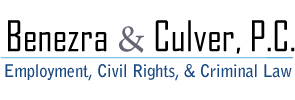A plaintiff filing a Title VII claim must file the charge with either the Equal Employment Opportunity Commission (“EEOC”) either 180 or 300 days after an alleged unlawful employment practice. 42 U.S.C. ß2000e-5(e)(1). However, the United States Supreme Court reached a compromise with respect to employee claims based on illegal acts which occured outside of this applicable time period.
In National Railroad Passenger Corp. v. Morgan, 122 S. Ct. 2061, 151 L. Ed. 106 (June 10, 2002), an African-American employee brought claims under Title VII alleging that he had been subject to discriminatory and retaliatory acts and had experienced a racially hostile work environment throughout his employment. However, some of the discriminatory acts occured outside of the applicable 300-day time period. The Court held that an employee who raises claims of discrete discriminatory or retaliatory acts, such as non-promotion or termination, which occured outside of the applicable time period are time barred because each “unlawful employment practice” constitutes a discrete act of a single “occurance.” On the other hand, an employee who has filed a claim for hostile work environment may recover for all hostile acts, even if part of those acts occurred outside of the applicable time period, as long as one act occurs within the 300-day period. The Court reasoned that because hostile work environment claims by their nature involve repeated conduct, this claim constitutes a series of separate acts that collectively constitute one “unlawful employment practice.”
